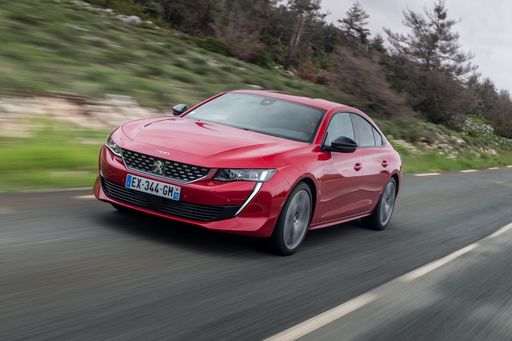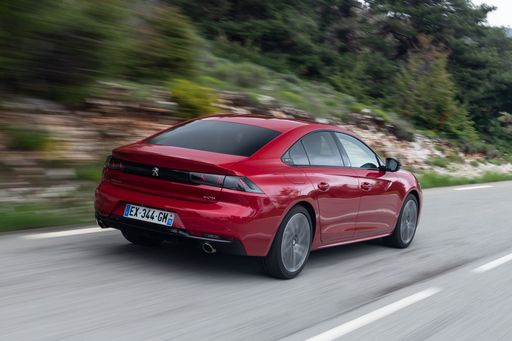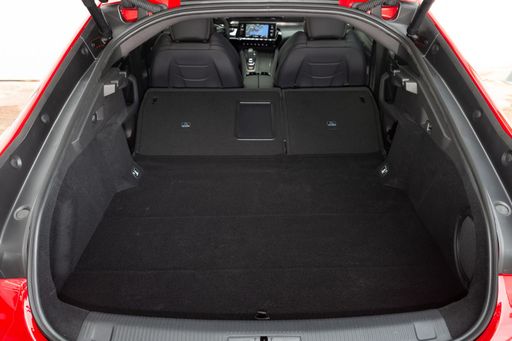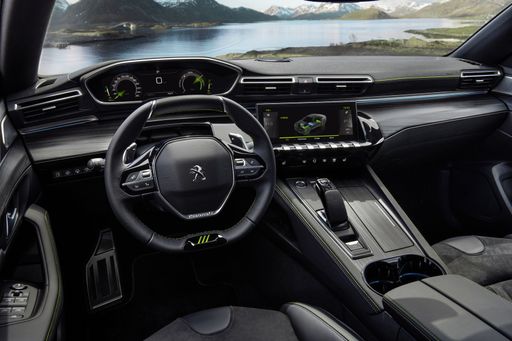Hyundai Bayon vs Peugeot 508 – Differences & prices compared
Compare performance, boot space, consumption and price in one view.
Find out now: which car is the better choice for you – Hyundai Bayon or Peugeot 508?
The Hyundai Bayon (SUV) comes with a Petrol engine and Manuel or Automatic transmission. In comparison, the Peugeot 508 (Hatchback) features a Plugin Hybrid engine with Automatic transmission.
When it comes to boot capacity, the Hyundai Bayon offers 411 L, while the Peugeot 508 provides 487 L – depending on how much space you need. If you’re looking for more power, decide whether the 100 HP of the Hyundai Bayon or the 360 HP of the Peugeot 508 suits your needs better.
In terms of consumption, the values are 5.40 L per 100 km for the Hyundai Bayon, and 1.60 L for the Peugeot 508.
Price-wise, the Hyundai Bayon starts at 20100 £, while the Peugeot 508 is available from 44600 £. Compare all the details and find out which model fits your lifestyle best!
Hyundai Bayon
The Hyundai Bayon is a compact crossover that effortlessly merges practicality with modern design. Its sleek exterior and spacious interior make it an ideal choice for urban settings and longer journeys alike. With a focus on comfort and connectivity, this vehicle provides a smooth driving experience paired with advanced technology features.
details @ hyundai.news
@ hyundai.news
 @ hyundai.news
@ hyundai.news
 @ hyundai.news
@ hyundai.news
 @ hyundai.news
@ hyundai.news
 @ hyundai.news
@ hyundai.news
Peugeot 508
The Peugeot 508 stands out with its sleek and sophisticated design, embodying a perfect blend of style and performance. Its cabin is a testament to modern engineering, offering a spacious and comfortable environment with high-quality materials throughout. As you glide down the road, the smooth handling and advanced technology make every journey a true pleasure, highlighting Peugeot's commitment to innovation and driver satisfaction.
details @ media.stellantis.com
@ media.stellantis.com
 @ media.stellantis.com
@ media.stellantis.com
 @ media.stellantis.com
@ media.stellantis.com
 @ media.stellantis.com
@ media.stellantis.com

|

|
|
|
|
Costs and Consumption |
|
|---|---|
|
Price
20100 - 25800 £
|
Price
44600 - 60800 £
|
|
Consumption L/100km
5.4 - 5.5 L
|
Consumption L/100km
1.6 - 2 L
|
|
Consumption kWh/100km
-
|
Consumption kWh/100km
-
|
|
Electric Range
-
|
Electric Range
46 - 55 km
|
|
Battery Capacity
-
|
Battery Capacity
-
|
|
co2
124 g/km
|
co2
36 - 45 g/km
|
|
Fuel tank capacity
40 L
|
Fuel tank capacity
43 L
|
Dimensions and Body |
|
|---|---|
|
Body Type
SUV
|
Body Type
Hatchback
|
|
Seats
5
|
Seats
5
|
|
Doors
5
|
Doors
5
|
|
Curb weight
1170 - 1195 kg
|
Curb weight
1811 - 1941 kg
|
|
Trunk capacity
411 L
|
Trunk capacity
487 L
|
|
Length
4180 mm
|
Length
4750 mm
|
|
Width
1775 mm
|
Width
1859 mm
|
|
Height
1500 mm
|
Height
1403 mm
|
|
Payload
460 - 465 kg
|
Payload
379 - 469 kg
|
Engine and Performance |
|
|---|---|
|
Engine Type
Petrol
|
Engine Type
Plugin Hybrid
|
|
Transmission
Manuel, Automatic
|
Transmission
Automatic
|
|
Transmission Detail
Manual Gearbox, Dual-Clutch Automatic
|
Transmission Detail
Automatic Gearbox
|
|
Drive Type
Front-Wheel Drive
|
Drive Type
Front-Wheel Drive, All-Wheel Drive
|
|
Power HP
100 HP
|
Power HP
180 - 360 HP
|
|
Acceleration 0-100km/h
11.3 - 12.4 s
|
Acceleration 0-100km/h
5.2 - 8.2 s
|
|
Max Speed
176 - 179 km/h
|
Max Speed
230 - 250 km/h
|
|
Torque
172 - 200 Nm
|
Torque
360 - 520 Nm
|
|
Number of Cylinders
3
|
Number of Cylinders
4
|
|
Power kW
74 kW
|
Power kW
133 - 265 kW
|
|
Engine capacity
998 cm3
|
Engine capacity
1598 cm3
|
General |
|
|---|---|
|
Model Year
2024
|
Model Year
2024
|
|
CO2 Efficiency Class
D
|
CO2 Efficiency Class
B
|
|
Brand
Hyundai
|
Brand
Peugeot
|
Hyundai Bayon
Introducing the Hyundai Bayon: A New Era in Compact SUVs
The Hyundai Bayon, a compact SUV designed with urban adventurers in mind, is making waves with its exceptional blend of style, performance, and technology. The brand has pulled out all the stops to ensure that the Bayon stands out in the crowded SUV market, offering a vehicle that is both practical and innovative.
Sleek Design and Cutting-Edge Aerodynamics
The Bayon features a striking exterior design, characterised by its bold lines and angular shapes. With a length of 4180 mm, a width of 1775 mm, and a height of 1500 mm, the Bayon commands attention with its modern appeal and aerodynamic efficiency. These dimensions not only contribute to its sleek design but also enhance fuel efficiency, achieving an impressive 5.4 L/100 km.
Engine Performance and Specifications
Under the bonnet, the Bayon is powered by a 1.0-litre T-GDI petrol engine, delivering a robust 100 PS or 74 kW. This engine is available with either a manual or automatic gearbox, meeting varied driver preferences. The front-wheel-drive system complements its urban-centric design, ensuring a smooth and responsive ride.
Maximised Interior Space and Comfort
The spacious interior of the Bayon accommodates up to five passengers comfortably. The vehicle boasts a boot space of 411 litres, perfect for both everyday use and weekend getaways. The cabin is designed with practicality and technology in mind, with intuitive controls and ample storage options.
Advanced Technology and Connectivity
Hyundai has equipped the Bayon with state-of-the-art technology to enhance the driving experience. The SUV features a high-resolution touchscreen, offering seamless connectivity with Apple CarPlay and Android Auto. Safety is also a priority, with multiple driver assistance systems including lane-keeping assist and forward collision avoidance assist.
Environmental Efficiency
Despite its powerful performance, the Bayon achieves a respectable CO2 efficiency class of D, with emissions as low as 122 g/km. This balance between performance and environmental responsibility makes the Bayon an attractive option for conscientious drivers.
Affordability and Market Appeal
The Hyundai Bayon is competitively priced, ranging from €22,900 to €29,600. Its affordable running costs, estimated at 32.3 to 36.4 cents per kilometre, further enhance its appeal to budget-conscious consumers. With monthly costs ranging from €806 to €909, the Bayon provides excellent value without compromising on features or performance.
Final Thoughts
The Hyundai Bayon truly stands out in the compact SUV segment, combining style, innovation, and practicality in an appealing package. It offers a versatile driving experience suited to the demands of modern urban living, making it a top contender in its class. As Hyundai continues to champion forward-thinking design and technology, the Bayon is a testament to the company's ongoing commitment to excellence.
Peugeot 508
Unleashing the Elegance: An Introduction to the Peugeot 508
The Peugeot 508 is a testament to the fusion of elegance and innovation, setting new benchmarks for mid-size saloons in the competitive automotive market. This remarkable vehicle from the French marque, Peugeot, offers an exceptional blend of modern design, hybrid efficiency, and dynamic performance.
Power and Efficiency: Examining the Peugeot 508's Plug-in Hybrid Technology
At the heart of the Peugeot 508's appeal lies its advanced plug-in hybrid technology. Customers can choose from a range of power outputs, with options delivering between 180 PS and an imposing 360 PS. Remarkably, this hybrid system allows for an impressive fuel consumption rate ranging from 1.3 to 2 L/100km, coupled with an electric range of up to 55 km. This efficiency does not come at the expense of performance, with the vehicle capable of accelerating from 0 to 100 km/h in just 5.2 to 8.2 seconds, depending on the variant.
Dynamic Design: The Aesthetic Allure of the Peugeot 508
The Peugeot 508 stands out with its distinctive fastback silhouette, epitomising the term “Schrägheck”. Its sleek lines and aerodynamic profile give it a striking presence on the road, while the spacious interior provides comfort for up to five passengers. With an overall length of 4750 mm, a width of 1859 mm, and a height of 1403 mm, the 508 is designed to be both stylish and practical.
Technological Innovations: Advanced Features of the 508
The 508 does not disappoint when it comes to cutting-edge technology. Equipped with an advanced automatic transmission, the driving experience is smooth and responsive. The model also boasts innovative safety and connectivity features, contributing to both driver and passenger comfort and security.
Performance and Precision: Handling and Dynamics
Thanks to its high torque, ranging from 360 Nm to 520 Nm, the Peugeot 508 offers excellent handling and driving dynamics. The availability of both front-wheel and all-wheel drive options ensures that the vehicle can perform in various driving conditions, providing an assurance of safety and stability.
Conclusion: The Peugeot 508 as a Modern Marvel
With a price range of €52,000 to €70,900, the Peugeot 508 offers a competitive edge in its class, providing luxury, innovation, and efficiency. Its combination of cutting-edge hybrid technology, style, and performance makes it a compelling choice for those who seek sophistication and sustainability in a modern vehicle.
The prices and data displayed are estimates based on German list prices and may vary by country. This information is not legally binding.
